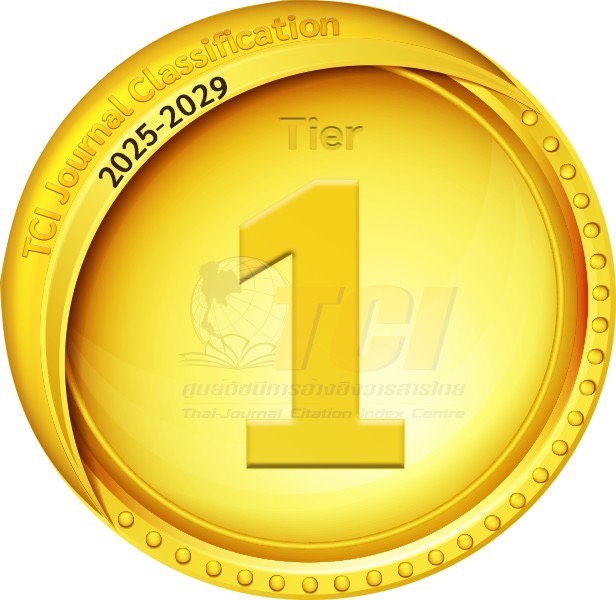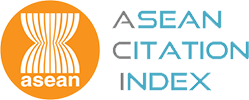Development of Grade 12 Students’ Mental Model of Gene and Chromosome though Model-Based Learning.
Keywords:
mental model, model – based learning, gene and chromosomeAbstract
บทคัดย่องานวิจัยเชิงปฏิบัติการในชั้นเรียนนี้มีวัตถุประสงค์เพื่อพัฒนาแบบจำลองทางความคิดเรื่องยีนและโครโมโซมของนักเรียนด้วยการเรียนรู้โดยใช้แบบจำลองเป็นฐาน กลุ่มที่ศึกษา คือ นักเรียนชั้นมัธยมศึกษา ปีที่ 6 จำนวน 1 ห้องเรียน นักเรียนจำนวน 29 คน โรงเรียนระดับมัธยมศึกษาที่เน้นความเป็นเลิศด้านวิทยาศาสตร์แห่งในจังหวัดนนทบุรี เก็บรวบรวมข้อมูลโดยใช้แบบวัดแบบจำลองทางความคิดเรื่องพันธุศาสตร์ วิเคราะห์ข้อมูลโดยจัดกลุ่มแบบจำลองทางความคิดของนักเรียนออกเป็น 4 กลุ่ม ได้แก่ กลุ่มไม่มีคำตอบ กลุ่มแบบจำลองขั้นต้น กลุ่มแบบจำลองถูกต้องแต่ไม่สมบูรณ์และกลุ่มแบบจำลองวิทยาศาสตร์ ใช้สถิติเชิงพรรณนาในการวิเคราะห์ข้อมูล ทดสอบการเปลี่ยนแปลงแบบจำลองทางความคิดในแต่ละบุคคลด้วยสถิติ Wilcoxon Matched Pairs Signed-Ranks Test และหารูปแบบการเปลี่ยนแปลงแนวคิดก่อนและหลังเรียน ผลการวิจัยพบว่า การจัดการเรียนรู้โดยใช้แบบจำลองเป็นฐานสามารถพัฒนาแบบจำลองทางความคิดได้ทุกแนวคิด โดยเฉพาะเรื่องการจำลองดีเอ็นเอ ความสัมพันธ์ระหว่างดีเอ็นเอกับโปรตีน การสังเคราะห์โปรตีนและการกลาย ที่ระดับนัยสำคัญ .01 และแต่ละแนวคิดมีแบบแผนการเปลี่ยนแปลงแบบจำลองต่างกัน การศึกษานี้แสดงให้เห็นถึงรูปแบบการจัดการเรียนรู้ที่ช่วยให้นักเรียนพัฒนาแบบจำลองทางความคิดในเนื้อหาพันธุศาสตร์ ซึ่งมีความซับซ้อน มีลักษณะเป็นกระบวนการ และมีความเป็นนามธรรมได้ โดยส่งเสริมให้นักเรียนสร้างแบบจำลองทางความคิด ทำการสำรวจตรวจสอบและแก้ไขแนวคิดของตนให้สอดคล้องกับแบบจำลองทางวิทยาศาสตร์ คำสำคัญ: แบบจำลองทางความคิด การเรียนรู้โดยใช้แบบจำลองเป็นฐาน ยีนและโครโมโซม ABSTRACTThis action research aimed to develop high school students’ mental model in the unit of gene and chromosome using model-based learning (MBI). The target group was a classroom of grade 12 students (n=29) from a science high school in Nonthaburi province, Thailand. To diagnose existing and revised mental models, Mental Model of Genetics Test (MMGT) was employed. Regarding data analysis, the responses were classified into four categories based on the degree of congruence with a scientific model; No Response, Initial Model, Synthesis Model, and Scientific Model. Descriptive statistics was used to provide summaries about the measures. Individual change in the type of a mental model over the course of intervention was examined, visualized and tested by Wilcoxon Matched Pairs Signed-Ranks Test. The different patterns of change were revealed by visual inspection. The statistical testing indicated that MBI could develop a mental model in most concepts; DNA replication, the relationship between DNA and protein, protein synthesis and mutation (P < .01) and there were various patterns of change in their mental model after the instruction. The study provides implication on how to develop a mental model for complicated, process-like and abstract concepts in Genetics by facilitating the students to build, collaboratively test, and revise the initial model to become a scientific model.Keywords: mental model, model–based learning, gene and chromosomeDownloads
Download data is not yet available.
Downloads
Published
2019-06-25
How to Cite
Rattanapanjak, W. (2019). Development of Grade 12 Students’ Mental Model of Gene and Chromosome though Model-Based Learning. Science Essence Journal, 35(1), 1–18. Retrieved from https://ejournals.swu.ac.th/index.php/sej/article/view/9902
Issue
Section
Research Article








